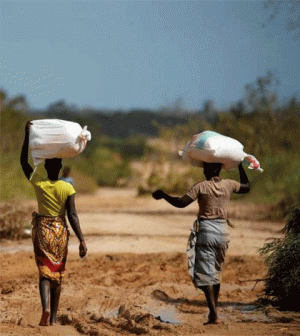- Finding Unshakable Power in a World That Wants to Pull Us ApartPosted 6 months ago
- What could a Donald Trump presidency mean for abortion rights?Posted 6 months ago
- Financial Empowerment: The Game-Changer for Women in Relationships and BeyondPosted 7 months ago
- Mental Health and Wellbeing Tips During and After PregnancyPosted 7 months ago
- Fall Renewal: Step outside your Comfort Zone & Experience Vibrant ChangePosted 7 months ago
- Women Entrepreneurs Need Support SystemsPosted 7 months ago
U.N. to probe sex-for-food aid allegations after Mozambique's Cyclone Idai

By Nita Bhalla | Thomson Reuters Foundation
Community leaders were accused of demanding money from survivors so they could receive aid, while others coerced women into having sex for a bag of rice.
NAIROBI, April 26 – The United Nations said on Friday it will investigate allegations that survivors of a deadly cyclone in Mozambique are being forced to have sex with community leaders for food.
More than 1,000 people died and tens of thousands were forced from their homes when Cyclone Idai hammered Mozambique before moving inland to Malawi and Zimbabwe, in one of the worst climate-related disasters to hit the southern hemisphere.
The U.N. pledge came a day after Human Rights Watch (HRW) published accounts of female survivors who said they were abused by local leaders and as a second powerful storm, Cyclone Kenneth, pounded the impoverished southeast African nation.
“As with any report on sexual exploitation and abuse, we are acting swiftly to follow-up on these allegations, including with the relevant authorities,” the U.N. Office for the Coordination of Humanitarian Affairs (UNOCHA) said in a statement.
“The U.N. has a zero tolerance policy on sexual exploitation and abuse. It is not, and never will be, acceptable for any person in a position of power to abuse the most vulnerable, let alone in their time of greatest need.”
Officials from Mozambique’s disaster management authority were not immediately available for comment.
The UNOCHA said it had broadcast clear messaging through multiple communications channels that aid is free and sexual exploitation and abuse are unacceptable.
The agency has also trained hundreds of aid workers and volunteers on the prevention of sexual exploitation and abuse, it said, adding there were “established clear referral pathways for any potential case of sexual exploitation and abuse”.
HRW said they had spoken to 12 women in Mozambique’s central Nhamatanda district who were sexually exploited, and also had accounts from aid workers and residents in other parts of the country hit by Idai, including the port city of Beira.
The community leaders – believed to be linked to the ruling Frelimo party – demanded money from survivors to have their names included on aid distribution lists, while others coerced women into having sex for a bag of rice, said the rights group.
“The sexual exploitation of women struggling to feed their families after Cyclone Idai is revolting and cruel and should be stopped immediately,” said Dewa Mavhinga, Southern Africa director at Human Rights Watch in a statement.
“The authorities should promptly investigate reports of women being coerced into exchanging sex for food and appropriately punish anyone using their position of power to exploit and abuse women.”
International partners, particularly the U.N., should ensure greater oversight of the conduct of local officials during the distribution of humanitarian aid, added the rights group.
(Reporting by Nita Bhalla @nitabhalla, Editing by Claire Cozens. Please credit the Thomson Reuters Foundation, the charitable arm of Thomson Reuters, that covers humanitarian news, women’s and LGBT+ rights, human trafficking, property rights and climate change. Visit http://news.trust.org)
Our Standards: The Thomson Reuters Trust Principles.






